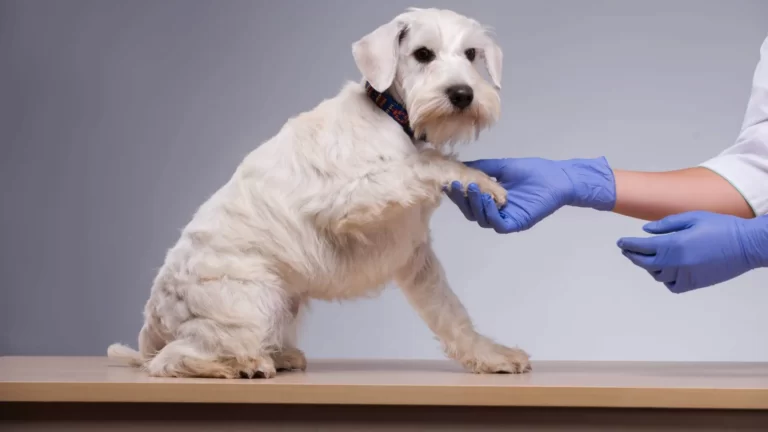Help, My Dog Vomits White Foam! What Should You Do!
Most of us are pet lovers. We love to have pets at our home. We love to play and spend time with them. It might be terrifying when you watch your dog vomiting as a pet owner. White foam vomit is one specific kind that terrifies dog owners a lot. Understanding possible causes and the measures you can take to assist your pet is essential for their well-being.
Now let’s explore the causes of dogs vomiting up white foam, any possible health risks, and what you can do to treat the problem.
What Is White Foam Vomit?
White foam vomiting in dogs happens primarily because of mucus and undigested foods. Dogs vomit if they have an empty stomach for a longer time or by consuming undigested foods. It has a frothy, foamy texture that could render it hard to recognize. Source
Common Causes of White Foam Vomit
Empty Stomach
An empty stomach is one of the reasons why white foam vomits cause. A long time on an empty stomach can cause an excessive production of gastric acid in dogs. White foam can cause as a result of these acids hurting the stomach lining. This usually occurs in dogs who skip meals or are fed frequently.
Gastritis
Dogs might also throw up white foam due to an inflammation of the stomach lining called gastritis. Taking irritating items, such as spoiled food, specific chemicals, or non-food items, might cause this type of syndrome. Foam vomiting is a common side effect of nausea and discomfort related to gastritis.
Indigestion
Dyspepsia, often known as indigestion, is the result of a dog’s digestive issues. White foam vomiting and nausea may result from this. A change in diet, eating too quickly, or swallowing anything that clashes with the dog’s stomach can all cause indigestion.
Gastrointestinal Obstruction
One of the main reasons for white foam vomiting is blockage in the gastrointestinal tract. Blockage in the intestines can be caused by consuming indigestive foods. This can lead to vomiting which fails to end, even with white foam. Lethargy, appetite loss, and stomach pain are some more indications of blockage.
Infections and Parasites
Viruses, bacteria, and parasite infections may also result in white foam vomiting. Irritable gastrointestinal disorders like worms or the parvovirus, which affects puppies, may worsen the digestive system and result in vomiting. Additional signs such as fever, diarrhea, or weight loss occur, an infection or parasite may be the primary reason.
Pancreatitis
White foam can happen as well as vomiting in cases of pancreatitis, or inflammation of the pancreas. A high-fat diet or taking anything that rarely appears in the dog’s food are the main causes of this condition. Major situations involving pancreatitis need emergency veterinarian care.
Kidney or Liver Disease
White foam vomiting is another sign of chronic liver or renal failure. Gastrointestinal symptoms arise from these conditions interacting with the body’s capacity to filter and process chemicals. Symptoms of renal or liver issues in dogs can also include dehydration, frequent urination, or jaundice.
What to Do When Your Dog Vomits White Foam
Monitor Your Dog
Note your dog’s behavioral activities and symptoms. Also, take note of the frequency of vomiting, any other symptoms, and any specific triggers that might be involved. Your veterinarian will find this information beneficial.
Adjust Feeding Schedule
Providing a limited amount of food frequently can prevent your pet’s stomach from feeling empty and have the possibility of a decrease in vomiting. If you think vomiting is a sign of an empty stomach, you should change the feeding schedule of your pet.
Avoid Feeding Unusual Foods
Ensure your dog consumes an appropriate diet; avoid providing new or odd foods that can cause digestive problems. Maintain providing your dog with a premium diet that is suitable for their size, age, and health concerns.
Hydrate
Even dehydration can also cause vomiting. Therefore, ensure your dog is getting enough clean and fresh water.
Consult Your Veterinarian
Consult a veterinarian, if you find your dog is Vomiting white foam continuously as it is a warning sign for us. If you find any other indicators such as chronic vomiting, lethargy, changes in appetite, or any other signs of feeling uncomfortable future checkup has to be done at most prior. Getting a diagnostic test will help a lot to identify the actual reason from the root so that doctor would recommend the best course for quicker results to be followed.
When to Seek Immediate Veterinary Care
Some other conditions where you need an immediate call of action are:
- Persistent Vomiting: Vomiting more than once in a short period is considered as persistent Vomiting.
- Critical conditions: conditions such as weakness, uneasy stomach, or weirdness in behavior are some other critical conditions that indicate that your pet is unhealthy.
- Dehydration: Dehydration indicators would be dry gums, intense thirst, or decreased skin elasticity.
- Other Health Concerns: Harming substances or showing unexpected warning signs.
Conclusion:
In conclusion, if your dog is Vomiting continuously that indicates it has a serious health issue and needs an emergency consultation. Sometimes, this can lead to small indigestion problems to serious health issues. Hence, it is always better to get treated first than to increase the issue. Consulting a veterinarian, discussing the problem, and finding solutions can help your pet stay happy and healthy. Prioritize your dog’s health above everything else, and seek expert guidance if you have any concerns.
Also read, Can Dogs Drink Beer?







